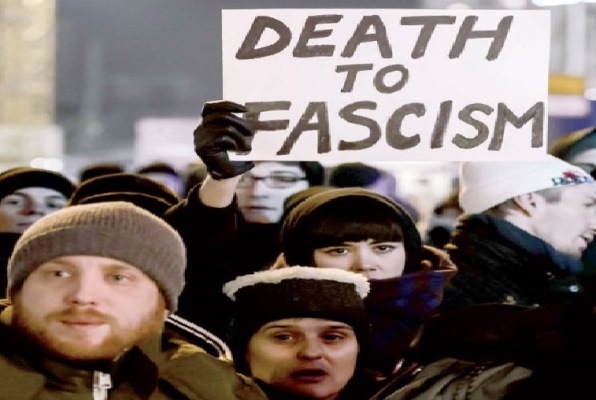Is this the new face of fascism in the West?
Rami Rayess / The Arab Weekly
20 فبراير 2017

Only about a month after Donald Trump stepped into the White House, there is rising fear around the globe about whether his policies would lead to a descent into chaos. Is the world on the verge of a new disorder, rather than order, shifting from traditional alliances towards new sorts of conflicts?
Obviously, new demarcating lines at the international level are being sketched politically. The Iran nuclear deal seems in jeopardy, extending the life of Syrian President Bashar Assad’s regime under the pretext of fighting the Islamic State (ISIS), reframing US ties with NATO according to new standards, rebuilding those with Moscow and preserving a bias towards Israel are a few ramifications of Trump’s policies.
The populist upsurge in the United States and other parts of the West will pave the way for aggravating extremism around the globe. The Arab world seems to be the most affected by this upsurge. There are several reasons for this. Dividing US society along racial or religious lines will lead to the gradual exposure of cultural differences among the various groups, weakening the integration of minorities into society. Hardliners will have their margin to confront those minorities in different ways.
Meanwhile, as long as traditional conflicts in the Middle East are not resolved, a wave of anti-Americanism is expected to rise, especially in the Arab world. The Palestinian situation will remain a time bomb.
Michael Kazin, a Georgetown University history professor coined the term “Make America Hate Again”, a play on Trump’s slogan “Make America Great Again”. Not only will the immigration measures taken by Trump aggravate the East-West clash, they might also undermine traditional American values that were based on equality, freedom and liberty.
The melting pot, America’s traditional approach, will be at stake as the divide within the American community is exacerbated among natives and immigrants, notwithstanding racial considerations.
While no US administration has fully ignored local concerns at the expense of foreign policy, the new administration seems to be fixed on domestic affairs. In cases in which there are approaches to international issues, a drastic shift appears to be underway. The way the United States has, in one way or another, monopolised and dominated world leadership after the collapse of the Soviet Union looks deeply contested.
Not only is the media leakage regarding Russian intelligence intervention in US presidential elections in favour of Trump unprecedented but also the mild approach of Trump towards Russian President Vladimir Putin raises a series of questions pertaining to their mutual relations and their effects on the international sphere.
The Ukraine crisis is an example that proves this trend. Despite American-Ukrainian relations being close for two-and-a-half decades, only a few hours after a friendly phone call between Trump and Putin, battles erupted in Eastern Ukraine.
The Organisation for Security and Co-operation in Europe estimated there were more than 10,000 explosions in Ukraine on January 31st, compared to a few hundred on January 26th.
Thousands of civilians were trapped outside in the town of Avdiivka, north of the city of Donetsk, and were under Russian and separatist fire. The international community refrained from even issuing condemnations.
The debate over populism will be on the rise as French elections are coming up in addition to other countries in Europe. Is this by any chance fascism remodelled?
 عن أمل جنبلاط المتجدد: لبنان يستحق النضال
عن أمل جنبلاط المتجدد: لبنان يستحق النضال
 صحافيون أم عرّافون!
صحافيون أم عرّافون!
 ماذا يجري داخل أروقة بيت الكتائب المركزي؟
ماذا يجري داخل أروقة بيت الكتائب المركزي؟


 عن الخرائط التي تُرسم والإتفاقات التي تتساقط!
عن الخرائط التي تُرسم والإتفاقات التي تتساقط!
 “الإنحراف في الحياة”/ بقلم كمال جنبلاط
“الإنحراف في الحياة”/ بقلم كمال جنبلاط
 هاشتاغ #صار_الوقت يحل أولاً في حلقة جنبلاط
هاشتاغ #صار_الوقت يحل أولاً في حلقة جنبلاط
 طاولة نقاش عن أزمة الصحافة في جامعة AUST
طاولة نقاش عن أزمة الصحافة في جامعة AUST
 عبدالله: ليظهر لنا وزير مكافحة الفساد حرصه في صفقات البواخر والفيول
عبدالله: ليظهر لنا وزير مكافحة الفساد حرصه في صفقات البواخر والفيول
 عبدالله: غريب أمر وزارة مكافحة الفساد!
عبدالله: غريب أمر وزارة مكافحة الفساد!

 Comment to Uri Avnery: How Sad What Is Looming Ahead
Comment to Uri Avnery: How Sad What Is Looming Ahead
 “Not Enough!”
“Not Enough!”
 … لمن لم يقرأ يوسف البعيني/ بقلم وسام شيّا
… لمن لم يقرأ يوسف البعيني/ بقلم وسام شيّا
 كمال جنبلاط في مولده الأول بعد المائة: تعاليمه وأفكاره ما زالت الحلّ/بقلم عزيز المتني
كمال جنبلاط في مولده الأول بعد المائة: تعاليمه وأفكاره ما زالت الحلّ/بقلم عزيز المتني
 رئيس حزب/ وليس (… سابقاً)/ بقلم د. خليل احمد خليل
رئيس حزب/ وليس (… سابقاً)/ بقلم د. خليل احمد خليل
 التوازن السياسي في لبنان
التوازن السياسي في لبنان
 لبنان… مشاريع انقلابية مؤجلة
لبنان… مشاريع انقلابية مؤجلة
 جنبلاط وحَمَلة أختام الكاوتشوك
جنبلاط وحَمَلة أختام الكاوتشوك
 Le Liban est un symbole de tolérance
Le Liban est un symbole de tolérance
 Our Automated Future
Our Automated Future
 The True Origins of ISIS
The True Origins of ISIS
 Les Misérables vs. Macron
Les Misérables vs. Macron
 عذراً أيها المعلم/ بقلم مهج شعبان
عذراً أيها المعلم/ بقلم مهج شعبان
 رساله الى المعلم / بقلم ابو عاصم
رساله الى المعلم / بقلم ابو عاصم
 إلى روح القائد والمعلم كمال جنبلاط/ بقلم أنور الدبيسي
إلى روح القائد والمعلم كمال جنبلاط/ بقلم أنور الدبيسي
 أسرار وعناوين الصحف ليوم الجمعة 14 كانون الاول 2018
أسرار وعناوين الصحف ليوم الجمعة 14 كانون الاول 2018














